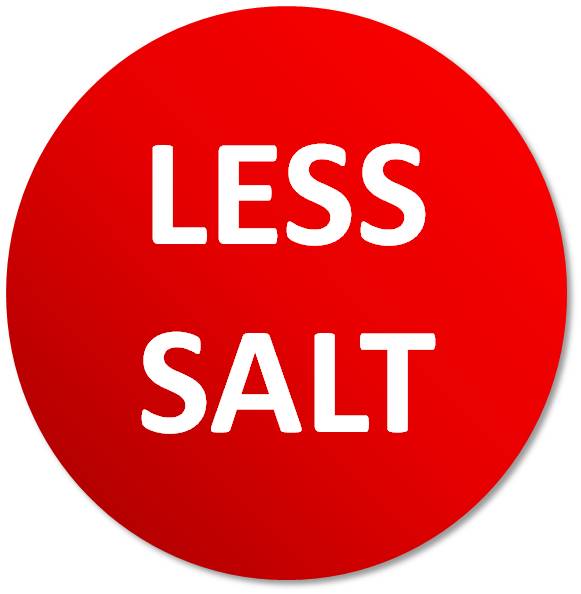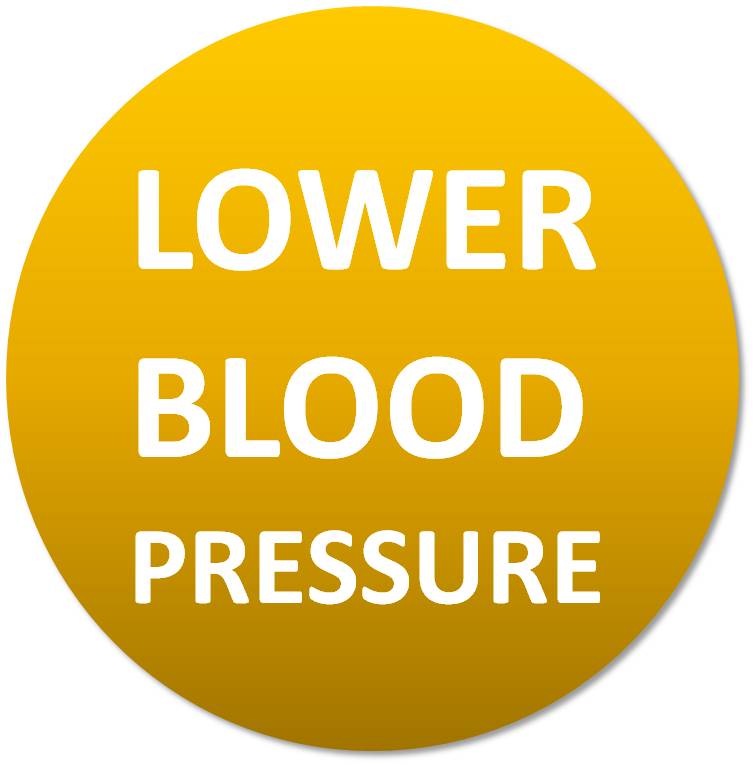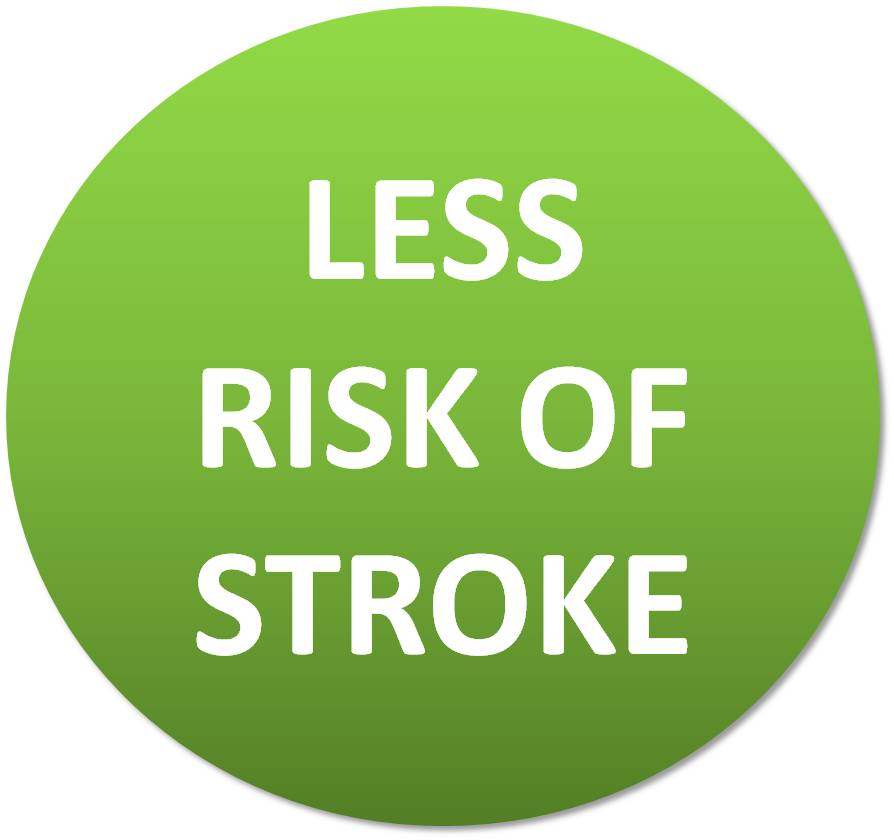Background
Reducing your risk of stroke through salt reduction can be as easy as 1, 2, 3! Click on the below images to find out more
1. Less salt: Choose lower salt foods and ingredients, don't add salt at the table or during cooking and read the labels. If it's got a red label think twice before making it a regular part of your diet. If it's green you're good to go!
2. Lower blood pressure: Cutting back on salt will lower your blood pressure and work to prevent the rise in blood pressure that usually occurs with age
3. Less risk of stroke: Reducing your blood pressure can lower your risk of having a stroke
Why stroke?
- Stroke is a leading cause of severe adult disability and the third biggest killer in the UK
- High blood pressure is the single most important risk factor for stroke and salt is the major factor that raises blood pressure - Salt is therefore responsible for many of these strokes
- Most of the UK population however are not aware of the link between salt and stroke
- The UK population is currently eating too much salt (8.6g/day compared to recommendation of 6g/day)
Click here to view our Salt Awareness Week editorial in the Nutrition Bulletin
Stroke is a leading cause of severe adult disability and the third biggest killer in the UK...
- There are an estimated 152 000 strokes per year (BHF, 2010), of these approximately
- 1/3 will die
- 1/3 will recover
- 1/3 are left disabled - Every five minutes someone in England will have a stroke (NAO 2005)
- By 2020, stroke mortality will have almost doubled worldwide, mostly due to an aging population (Warlow et al 2003)
- Having a stroke increases the chances of disability more markedly than any other condition.and causes a greater range of disabilities than any other condition (Adamson et al 2004)
- There are at least 300,000 people in England alone living with moderate to severe disabilities as a result of stroke (NAO, 2005)
Stroke is a significant cost burden to the NHS...
- In 2006 stroke cost the economy £8.3 billion in total including £3.2 billion in health care costs (BHF, 2010)
- Preventing just 2% of the strokes that occur in England in a year would save care costs of more than £37 million, over and above the non-financial benefits (NAO, 2007).
- Salt reduction is as effective as reductions in tobacco use, obesity, and cholesterol levels in terms of cardiovascular risk and would be more cost effective than using medications to lower blood pressure in all persons with hypertension.(Bibbins-Domingo et al 2009)
Salt, through its effect on blood pressure, increases risk of stroke...
- Raised blood pressure is the most important modifiable cause of stroke - causing 62% of strokes and mini strokes (WHO 2002 )
- 4 out of every 10 people who die of stroke could have been saved if their blood pressure had been regulated (WHO&CDC 2004)
- Nearly 40% of men and more than 30% of women in England have high blood pressure, a key risk factor for stroke. (BHF 2009)
- Reducing salt intake can reduce blood pressure and therefore stroke risk (He & MacGregor 2003)
- A 6g salt reduction / day would reduce strokes by 24%, preventing ~ 14,600 deaths / yr year in the UK
- A 3g salt reduction / day would reduce strokes by 13%, preventing ~7800 deaths / year
- A 1g reduction would prevent ~ 2600 deaths per year
There is a lack of awareness about salt and stroke...
- People don’t know eating less salt reduces our risk of stroke
- 9/10 Brits know eating salt is dangerous for them and
- 69% of adults know that salt can lead to high blood pressure but
- Only 34% know salt leads to stroke
- Only 1/5 know reducing blood pressure reduces stroke risk - Only 5% of the population reported being concerned about stroke when asked which health conditions they were most worried about
References
Adamson J., Beswick, A. and Ebrahim, S.,“ Is stroke the most common cause of disability?” Journal of Stroke and Cerebrovascular Diseases. 2004;13(4):171-177 http://www.sciencedirect.com/science/article/pii/S1052305704000709
Bibbins-Domingo K, Chertow GM, Coxson PG, Moran A, Lightwood JM, Pletcher MJ, et al. Projected effect of dietary salt reductions on future cardiovascular disease. N Engl J Med. 2010;362:590-9.
British Heart Foundation statistics database Coronary heart Disease Statistics 2010 edition available at www.heartstats.org
British Heart Foundation statistics database Stroke Statistics 2009 edition available at www.heartstats.org
He FJ, MacGregor GA. How far should salt intake be reduced? Hypertension. 2003; 42:1093-1099
Lewington S et al. Age-specific relevance of usual blood pressure to vascular mortality: a meta-analysis of individual data for one million adults in 61 prospective studies. The Lancet. 2002;360:1903-1913
National Audit Office, 2005. Brain Damage: Faster access to better stroke care. Available at http://www.nao.org.uk/publications/0506/reducing_brain_damage.aspx
National Audit Office, 2007. Available at http://www.nao.org.uk/publications/0506/reducing_brain_damage.aspx
National Audit Office, 2010. Progress in Improving Stroke Care. Available at http://www.nao.org.uk/publications/0910/stroke.aspx
Warlow, C., Sudlow, C., Dennis, M.,Wardlaw, J., Sandercock, P., “Stroke” The Lancet. 2003; 362(9391):1211–1224
World Health Organisation (WHO) & US Centers for Disease Control and Prevention (CDC) 2004 The Atlas of Heart Disease and Stroke part 3 deaths From Stroke http://www.who.int/cardiovascular_diseases/en/cvd_atlas_16_death_from_stroke.pdf





